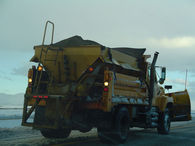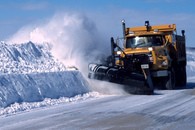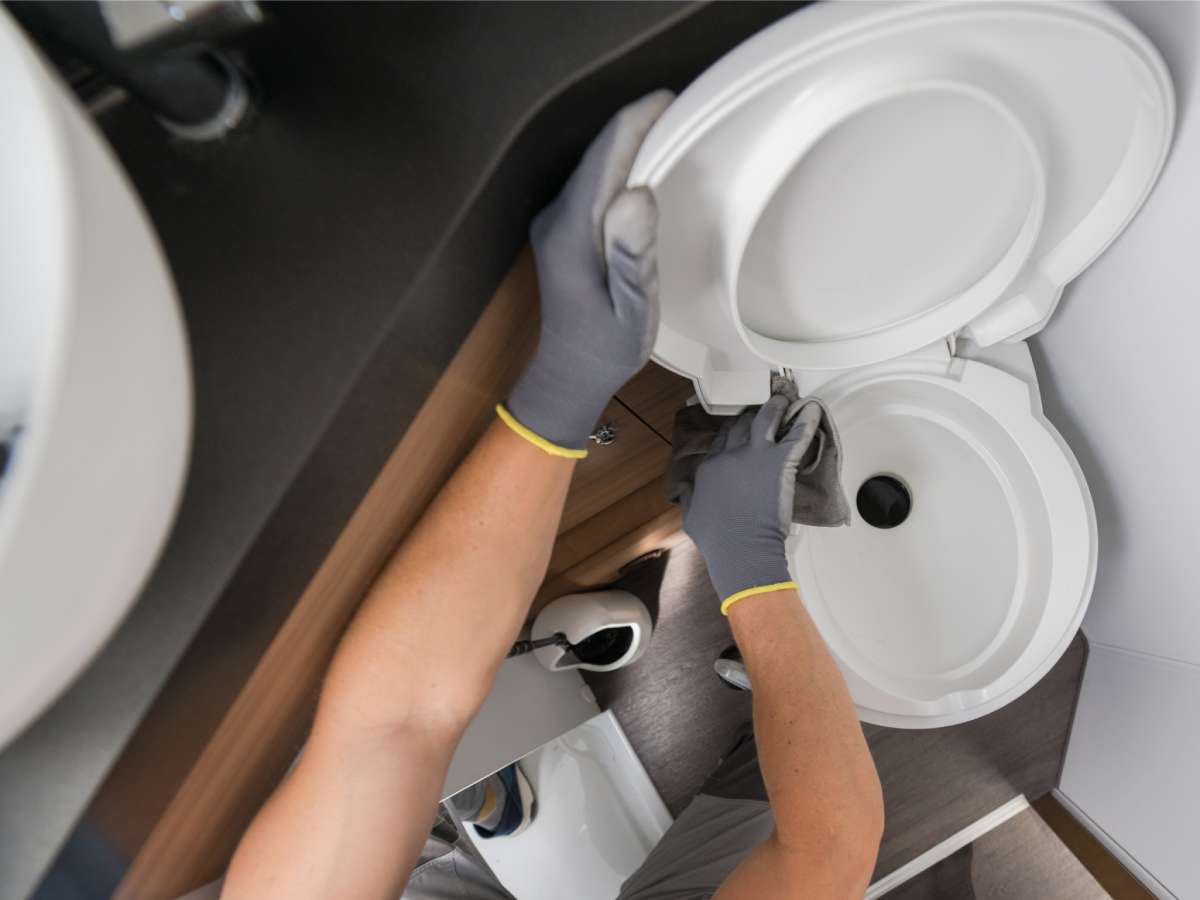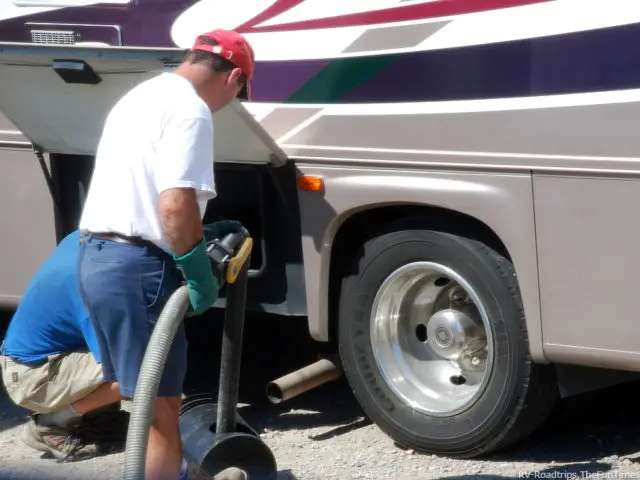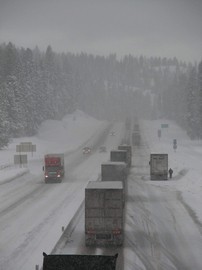 For those snowbirds who waited just one week too long before heading to their winter roost, you may be finding yourself smack in the middle of winter’s first snowstorm before you make it to the desert southwest.
For those snowbirds who waited just one week too long before heading to their winter roost, you may be finding yourself smack in the middle of winter’s first snowstorm before you make it to the desert southwest.
Whether you’re pulling a trailer or driving a motorhome, driving an RV in snow and on ice presents a whole new set of problems for someone who may only be driving such a large vehicle on an occasional basis.
Here’s what you need to know to drive your RV safely through snow, sleet, and ice…
Your RV Tires Are Important
Motorhomes, when delivered from the factory, are equipped with summer or highway tread tires.
The reasoning behind this is to give you the quietest and most comfortable driving conditions. A simple highway tread will not add the extra noise of a traction lug to your driving environment. A highway tread tire will also provide better longevity — always a good thing with the high cost of replacement tires.
Of course, this leaves you at a distinct disadvantage when foul weather comes your way when you’re traveling.
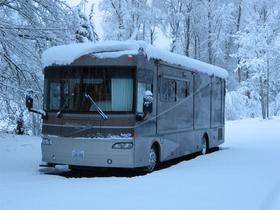 To a small degree, you have the advantage of weight. The heavier pressure applied per square inch of rubber on the road will help in maintaining traction.
To a small degree, you have the advantage of weight. The heavier pressure applied per square inch of rubber on the road will help in maintaining traction.
However, this can actually get you into trouble though because while cruising along you may feel stable and under control — only to lose traction and slide as soon as you attempt to stop or slow down.
Rear Wheel Drive vs Front Wheel Drive
Most current passenger cars are now front wheel drive. Over the past 30 years, the average driver has learned how to regain control in a skid with this configuration of drive train.
Motorhomes are rear wheel drive, so all those new generation driving techniques go right out the window. It’s back to steering with a slide and pumping the brakes lightly in order to attempt to regain control.
Getting into a slide can quickly become disastrous — especially if you’re towing an RV trailer!
Applying power may actually make matters worse. Unlike front wheel drive vehicles, where adding power may allow you to steer out of a slide, adding power to a rear wheel drive vehicle may compound the skid.
And by all means, make sure to leave extra space between you and other drivers.
Motorhomes & RV Trailers Handle Differently
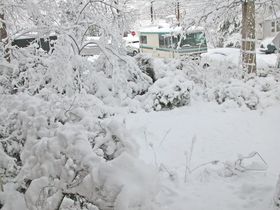 If a snow or ice storm is in progress, get off the highway ASAP and seek shelter until the weather passes and the roads have been cleared and sanded.
If a snow or ice storm is in progress, get off the highway ASAP and seek shelter until the weather passes and the roads have been cleared and sanded.
Here are some tips for driving through icing or heavy snow.
Sliding off the road in a motorhome may be much more expensive than just getting towed out of the ditch.
Motorhomes generally aren’t constructed strong enough to withstand the stress and twisting that will happen during an unexpected off-road excursion. Permanent structural damage is a real possibility.
Towing a trailer on an ice-covered highway can quickly lead to a jack-knifed condition, with the trailer pushing you out of control. Even if you have snow tires on your pickup, the weight of the trailer can easily overcome the traction of the truck and take you places you don’t want to go!
Some of the lower states like Oklahoma, and Texas don’t do very well at snow removal or salting of the roads to remove ice. It can easily take days before main highways like Interstate 35 have been cleared to good driving condition. Many times, it’s up to Mother Nature who does the job by the heat of the sun.
Be Prepared To Stop
You should always be prepared to be forced into holding up at some truck stop for days at a time until the roads are in safe traveling condition.
The RVers who get into the most trouble are those who think they can make it through the storm because it’s not that bad. Worse yet, are those from Minnesota like myself, who have driven year round in the worst possible conditions, so they think they can handle it.
During one particularly bad ice storm, I pulled into a wayside rest area in the middle of Oklahoma. I was only driving a little Ford Festiva (our Toad, aka small car towed behind our motorhome) and wanted to stop for a few hours sleep as I was driving from Minnesota back to Texas. When I woke up a few hours later, the wind had slid my car across the parking lot and I was resting against a large dumpster. That’s how icy the roads were! Trucks were in the ditches everywhere.
Winter driving in an RV is best done on clear blacktop. By scheduling the time to accommodate for bad weather, you will be more willing to drive conservatively.
If you recognize those times when continuing isn’t worth the risk, then you will be more likely to have a sa
fe journey. We all like getting back home without having to call the insurance agent to file a claim for damages.
But It Was Supposed To Be Warm!…
Maybe you’re not a snowbird, but rather an RVer who just wanted to take one more RV trip before the winter cold set in.
It’s true, late fall can be a wonderful time to travel in your RV. The foliage is colorful and the temperatures are a lot more comfortable. Instead of listening to your RV’s roof-top air conditioner labor all night long, you can open the windows and enjoy fresh air and a cool breeze.
However, Mother Nature can easily throw you a curve ball this time of year. A quick drop in temperature and that slight drizzle you went to sleep with might turn into 6 inches of snow by morning!
When you’re RVing, this usually isn’t a good thing.
It doesn’t have to ruin your trip though. As long as you take the time to prepare your RV for the winter season before you leave home, then you won’t be caught off-guard and you’ll be able to enjoy the white winter wonderland around you.
Just remember, driving an RV in winter conditions can be a little tricky so if it starts to get nasty while you’re driving, get off the road as soon as possible.
You have your kitchen and bedroom with you, so why get in a hurry when it isn’t safe to travel? As long as your RV is prepared for cold weather, it’s safer to wait for the storm to pass.

